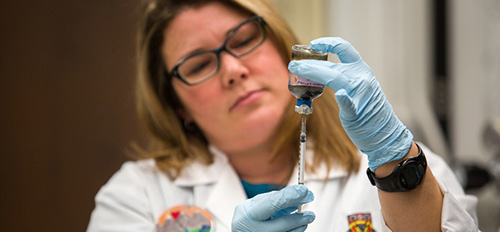WEDNESDAY, DECEMBER 14, 2016
A research project focused on microbiologically influenced corrosion (MIC) in pipelines is receiving nearly $8 million in funding toward ongoing research into the issue.
Managing Microbial Corrosion in Canadian Offshore and Onshore Oil Production—a four-year research project set to begin in January—will receive $7.8 million in funding from the Genome Canada 2015 Large-Scale Applied Research Project Competition (LSARP), the University of Calgary announced Thursday (Dec. 8).
It was among 13 projects receiving $32 million of the nonprofit’s support, Minister of Science Kirsty Duncan said Thursday. Funded by the Government of Canada, Genome Canada is a nonprofit organization that supports large-scale research applying genomics and genomic-based technologies to improve the lives of Canadians.

 |
| Photo by Riley Brandt, University of Calgary |
|
Four Canadian universities have received $7.8 million toward their research into the issue of pipeline corrosion caused by microbial activity. "This work can help make the industry safer,” says project leader Lisa Gieg of the University of Calgary. |
Corrosion of steel infrastructure reportedly costs the oil and gas industry $3 billion to $7 billion each year in maintenance, repairs and replacement. Of that, MIC is said to be responsible for approximately 20 percent of the cost.
“To some degree, (microbial degradation of pipelines) is akin to a cancer diagnosis and treatment in the medical field,” says project leader John Wolodko, an associate professor and Alberta Innovates Strategic Chair in Bio and Industrial Materials at the University of Alberta.
“While there is significant knowledge and best practices in diagnosing and treating cancer, it is still not completely understood, and significant research is still required to further eliminate its impact to society,” he explains.
Multidisciplinary Focus
Four Canadian universities are collaborating to tackle the issue of pipeline corrosion caused by microbial activity, with the goal of improving pipeline integrity, bringing a range of experience, skills and expertise from across a range of disciplines.
In addition to Wolodko, Faisal Khan, a professor and the Vale Research Chair of Process Safety and Risk Engineering at Memorial University in St. John’s, Newfoundland, and Lisa Gieg, an associate professor in the Department of Biological Sciences at the University of Calgary, are steering the research.
All three project leads agree that the collaborative aspect of their work will be key to the project’s success and for finding solutions to ensure the safety of pipelines and other oil and gas infrastructure.
“By bringing this multidisciplinary focus to this problem, it is hoped that this research will lead to a better understanding of the breadth of microbes responsible for microbial corrosion, and will help academia and industry develop improved solutions to rapidly identify and mitigate this form of corrosion globally,” Wolodko says.
 |
| © iStock.com / pichitstocker |
|
The research team will take samples from a wide range of environments, including offshore platforms, upstream pipelines and transmission pipelines, to look for trends related to specific microbes and chemistries that lead to microbial corrosion. |
Also working on the project is Rob Beiko, an associate professor in computer science and Canada Research Chair in Bioinformatics at Dalhousie University in Halifax, Nova Scotia, and Tesfaalem Haile, senior corrosion specialist at InnoTech Alberta in Devon, Alberta. Beiko will be building a database to analyze the microbiology and chemistry lab results, while Haile’s team will be working with the University of Alberta to simulate microbial corrosion in the lab and at the pilot-scale.
Research Focus
Khan says his team, for instance, will focus on how microbes cause corrosion.
“We are identifying the chemical source and how it reacts to the surface of the metal to cause corrosion,” says Khan. “The risk models that we’re developing will link the corrosion process to the outcome. This will be very important for industry when evaluating their level of corrosion intervention and control, and where to focus their resources on corrosion mitigation.”
The research team will take samples from a wide range of environments, including offshore platforms, upstream pipelines and transmission pipelines, which are all associated with different fluid chemistries and physical characteristics.
By using the latest in genomics techniques, the interdisciplinary team will be able to look for trends related to specific microbes and chemistries that lead to microbial corrosion.
Ultimately, the project will lead to better predictions of whether microbial corrosion will occur in a given oil and gas operation.
“This work will definitely help to pinpoint how microbial activity causes corrosion in carbon steel infrastructure and help in its early detection so we can minimize leaks,” says Lisa Gieg, an associate professor in the Department of Biological Sciences at the University of Calgary.
“It’s not just about pipelines,” she added; “this research will look at all points of contact between oil and steel in extraction, production and processing. This work can help make the industry safer.”
Tagged categories: Colleges and Universities; Corrosion; Corrosion protection; Funding; Microbiologically Induced Corrosion (MIC); Pipelines; Quality Control; Research and development